Related Research Articles
Mozambique was a Portuguese colony, overseas province and later a member state of Portugal. It gained independence from Portugal in 1975.
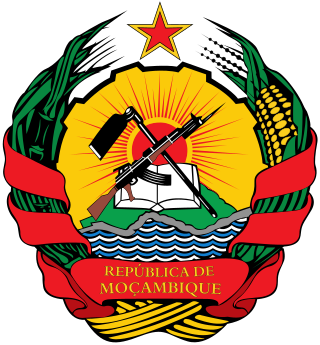
Politics in Mozambique takes place in a framework of a semi-presidential representative democratic republic, whereby the President of Mozambique is head of state and head of government in a multi-party system. Executive power is exercised by the government. Legislative power is vested in both the government and the Assembly of the Republic.

The Zimbabwe Defence Forces (ZDF) are the military forces responsible for the defence of Zimbabwe against external threats from other countries, and also to suppress internal armed factions. It is composed of the Zimbabwe National Army (ZNA) and the Air Force of Zimbabwe (AFZ).. Since December 2017 the ZDF is headed by General Philip Valerio Sibanda.

The Gukurahundi was a series of mass killings in Zimbabwe which were committed from 1983 until the Unity Accord in 1987. The name derives from a Shona-language term which loosely translates to "the early rain which washes away the chaff before the spring rains".

Samora Moisés Machel was a Mozambican politician and revolutionary. A socialist in the tradition of Marxism–Leninism, he served as the first President of Mozambique from the country's independence in 1975.

Joshua Mqabuko Nyongolo Nkomo was a Zimbabwean revolutionary and politician who served as Vice-President of Zimbabwe from 1990 until his death in 1999. He founded and led the Zimbabwe African People's Union (ZAPU) from 1961 until it merged in 1987 with Robert Mugabe's Zimbabwe African National Union (ZANU) to form ZANU–PF after an internal military crackdown called Gukurahundi in western Zimbabwe, mostly on ethnic Ndebele ZAPU supporters.
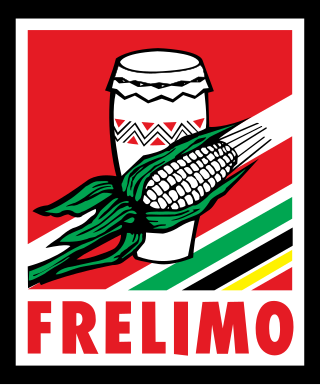
FRELIMO is a democratic socialist political party in Mozambique. It has governed the country since its independence from Portugal in 1975.

The Zimbabwe African People's Union (ZAPU) is a Zimbabwean political party. It is a militant communist organization and political party that campaigned for majority rule in Rhodesia, from its founding in 1961 until 1980. In 1987, it merged with the Zimbabwe African National Union-Patriotic Front.

RENAMO is a Mozambican political party and militant group. The party was founded with the active sponsorship of the Rhodesian Central Intelligence Organisation (CIO) in May 1977 from anti-communist dissidents opposed to Mozambique's ruling FRELIMO party. RENAMO was initially led by André Matsangaissa, a former senior official in FRELIMO's armed wing, and was composed of several anti-communist dissident groups which appeared immediately prior to, and shortly following, Mozambican independence. Matsangaissa, who died in 1979, was succeeded by Afonso Dhlakama, who led the organization until he died in 2018. He was succeeded by Ossufo Momade.
The 5th Brigade is an infantry brigade of the Zimbabwe National Army (ZNA). The 5th Brigade was created in 1981 from three former battalions of the Zimbabwe African National Liberation Army (ZANLA). It later incorporated over 3,000 ex-ZANLA guerrillas from various units. The brigade was based in Gweru and participated in the Mozambican Civil War as well as a genocide known as the Gukurahundi which targeted Ndebele civilians and Zimbabwe People's Revolutionary Army (ZIPRA) guerrillas.

The Rhodesian Bush War also known as the Second Chimurenga as well as the Zimbabwean War of Independence, was a civil conflict from July 1964 to December 1979 in the unrecognised country of Rhodesia.

The Zimbabwe National Army (ZNA) is the primary branch of the Zimbabwe Defence Forces responsible for land-oriented military operations. It is the largest service branch under the Zimbabwean Joint Operations Command (JOC). The modern army has its roots in the Rhodesian Army, which was raised between 1963 and 1964 after the breakup of the Federation of Rhodesia and Nyasaland. A Joint High Command created in March 1980 to oversee integration of the formerly belligerent Rhodesian Security Forces, Zimbabwe African National Liberation Army (ZANLA), and the Zimbabwe People's Revolutionary Army (ZIPRA) officially established the Zimbabwe National Army in late 1980, nearly a year after the end of the Rhodesian Bush War.
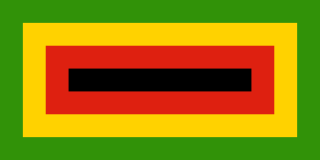
Zimbabwe African National Liberation Army (ZANLA) was the military wing of the Zimbabwe African National Union (ZANU), a militant African nationalist organisation that participated in the Rhodesian Bush War against white minority rule of Rhodesia.

The Mozambican Civil War was a civil war fought in Mozambique from 1977 to 1992. Like many regional African conflicts during the late twentieth century, the impetus for the Mozambican Civil War included local dynamics exacerbated greatly by the polarizing effects of Cold War politics. The war was fought between Mozambique's ruling Marxist Mozambique Liberation Front (FRELIMO), the anti-communist insurgent forces of the Mozambican National Resistance (RENAMO), and a number of smaller factions such as the PRM, UNAMO, COREMO, UNIPOMO, and FUMO.
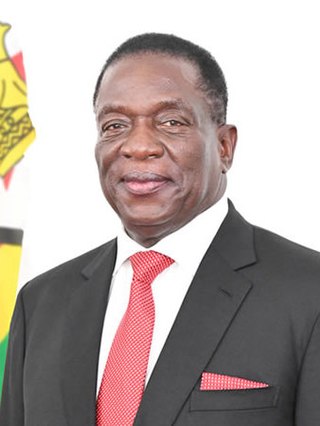
Emmerson Dambudzo Mnangagwa is a Zimbabwean politician who is serving as President of Zimbabwe since 24 November 2017. A member of ZANU–PF and a longtime ally of former President Robert Mugabe, he held a series of cabinet portfolios and he was Mugabe's Vice-President until November 2017, when he was dismissed before coming to power in a coup d'état. He secured his first full term as president in the disputed 2018 general election. Mnangagwa was re-elected in the August 2023 general election with 52.6% of the vote.
Moses Mzila Ndlovu is a Zimbabwean legislator and veteran of the 1970s liberation war. He is also a retired teacher and a member of the House of Assembly representing Bulilima West (MDC-M).

The RENAMO insurgency was a guerrilla campaign by militants of the RENAMO party and one of its splinter factions in Mozambique. The insurgency was widely considered to be an aftershock of the Mozambican Civil War; it resulted in renewed tensions between RENAMO and Mozambique's ruling FRELIMO coalition over charges of state corruption and the disputed results of the 2014 general elections.
Njini Ntuta was a Zimbabwe African People's Union (ZAPU) politician. He was deputy minister of mines in the first post-independence government but was sacked by President Robert Mugabe in a 1982 purge of ZAPU politicians. Ntuta was assassinated by members of the security forces acting on the orders of Colonel Flint Magama in 1984. At the time Mugabe's government blamed the murder on anti-government dissidents.
The following is a timeline of events during the Mozambican Civil War as well as subsequent RENAMO insurgency (2013–2021).
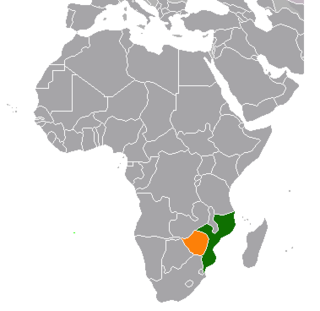
Mozambique–Zimbabwe relations refers to the bilateral relationship between Mozambique and Zimbabwe, two neighbouring Southern African nations. Both nations are members of the African Union, United Nations, Southern African Development Community and the Non-Aligned Movement. The countries share a common border over 1,000 kilometres totaling over 10,000 kilometres. While they face occasional strains, leadership is strategically committed to maintain strong bilateral ties.
References
- ↑ "Notices of Liquidation and Distribution Accounts Lying for Inspection" (PDF). Zimbabwean Government Gazette. 19 September 1986. Retrieved 17 January 2022.
- 1 2 "President Mourns Cde David Zizirai Mavima". ZANU PF. Retrieved 17 January 2022.
- 1 2 Cole, Barbara (1988). Sabotage and Torture. Three Knights. p. 19. ISBN 978-0-620-13026-4.
- 1 2 "Dyck's new Mozambican wild adventure". The Zimbabwe Mail. 6 November 2020. Retrieved 17 January 2022.
- ↑ "Mike Auret: the man who stood up to the Gukurahundi barbarians". Zimbabwe News Now. 10 April 2020. Retrieved 17 January 2022.
- ↑ New African Yearbook. IC Magazines Limited. 1987. p. 225. ISBN 978-0-905268-51-4.
- 1 2 Emerson, Stephen (30 July 2019). Mozambican Civil War: Marxist-Apartheid Proxy, 1977–1992. Pen and Sword. p. 137. ISBN 978-1-5267-2850-0.
- ↑ Kalley, Jacqueline Audrey; Schoeman, Elna; Andor, Lydia Eve (1999). Southern African Political History: A Chronology of Key Political Events from Independence to Mid-1997. Greenwood Publishing Group. p. 254. ISBN 978-0-313-30247-3.
- ↑ AIM Information Bulletin. The Agency. 1986. pp. 13–14.
- ↑ Legum, Colin; Drysdale, John Gordon Stewart (1985). Africa Contemporary Record: Annual Survey and Documents. Africana Publishing Company. p. 678. ISBN 978-0-8419-0556-6.
- ↑ The Army Quarterly and Defence Journal. West of England Press. 1986. p. 241.
- ↑ "Grant of Bravery Awards" (PDF). Zimbabwean Government Gazette. 21 June 1991. Retrieved 17 January 2022.
- ↑ "Soldier Lauds Army after Medical Assistance" (PDF). The Zimbabwe National Army. Second Quarter 2021. Retrieved 17 January 2022.